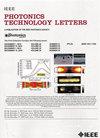用于光通信的具有不对称电极的自供电 Ga₂O₃ MSM 太阳能盲 UV 光致发光器件
IF 2.3
3区 工程技术
Q2 ENGINEERING, ELECTRICAL & ELECTRONIC
引用次数: 0
摘要
这项研究展示了一种基于 Ga2O3 的自供电金属半导体-金属日光盲紫外线光电探测器,该探测器采用了以下不同尺寸比的不对称电极:宽指肖特基互斥电极和窄指欧姆互斥电极。偏压为 0 V 时,肖特基电极与欧姆电极尺寸比为 8:1 的器件的响应率为 3.64 mA/W。因此,增加电极尺寸比能显著提高器件的自供电性能。利用能带结构理论,我们阐明了器件自供电性能提高的原因,即金属-半导体界面耗尽区的扩大促进了光生载流子的传输。该器件在 10 V 的正向偏压下实现了 495 A/W 的高响应率,而在 10 V 的反向偏压下仍保持了 16.7 A/W 的可观响应率。此外,该器件还实现了采用国际摩尔斯电码的紫外光通信。本文章由计算机程序翻译,如有差异,请以英文原文为准。
Self-Powered Ga₂O₃ MSM Solar-Blind UV PDs With Asymmetric Electrodes for Optical Communications
This work demonstrated a self-powered Ga2O3-based metal–semiconductor–metal solar-blind ultraviolet photodetector using the following asymmetric electrodes at varying size ratios: a Schottky interdigitated electrode with wide fingers and an ohmic interdigitated electrode with narrow fingers. At a bias of 0 V, the responsivity of the device featuring Schottky electrode to ohmic electrode size ratios of 8:1 is 3.64 mA/W. Thus, increasing electrode size ratios led to significant enhancements in device self-powered performance. Leveraging the energy band structure theory, we elucidated the rationale behind the improved self-powered performance of the devices, attributing it to the broadening of the depletion region at the metal–semiconductor interface, which facilitated photogenerated carrier transport. The device exhibited a high responsivity of 495 A/W under a forward bias of 10 V while still maintaining a considerable responsivity of 16.7 A/W under a reverse bias of 10 V. Additionally, the device realizes UV optical communication adopting international Morse code.
求助全文
通过发布文献求助,成功后即可免费获取论文全文。
去求助
来源期刊

IEEE Photonics Technology Letters
工程技术-工程:电子与电气
CiteScore
5.00
自引率
3.80%
发文量
404
审稿时长
2.0 months
期刊介绍:
IEEE Photonics Technology Letters addresses all aspects of the IEEE Photonics Society Constitutional Field of Interest with emphasis on photonic/lightwave components and applications, laser physics and systems and laser/electro-optics technology. Examples of subject areas for the above areas of concentration are integrated optic and optoelectronic devices, high-power laser arrays (e.g. diode, CO2), free electron lasers, solid, state lasers, laser materials'' interactions and femtosecond laser techniques. The letters journal publishes engineering, applied physics and physics oriented papers. Emphasis is on rapid publication of timely manuscripts. A goal is to provide a focal point of quality engineering-oriented papers in the electro-optics field not found in other rapid-publication journals.
 求助内容:
求助内容: 应助结果提醒方式:
应助结果提醒方式:


